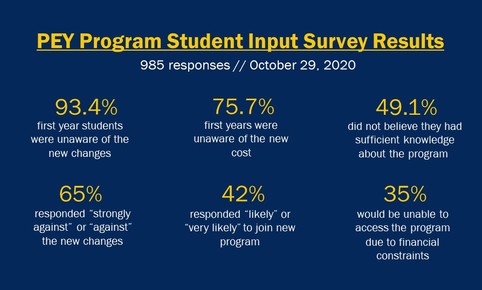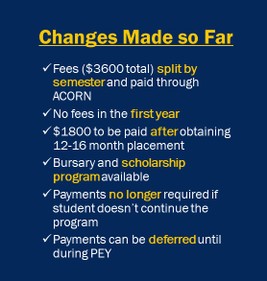Ruknoon Dinder
Cannon Editor
The Faculty of Applied Science and Engineering (FASE) Professional Experience Year (PEY) program was in need of a major overhaul, until this year. Numerous issues, including a forced financial structure, outdated workshops, and a lack of diverse job options, were acting as an unintended barrier to students searching for professional development options. A plan was proposed in 2017 to rework the program to make it more student friendly.
Finally, on October 5th, 2020, after months of consultation with the Engineering Society’s representatives as well as other relevant stakeholders, this new plan finally saw a concrete structure. The FASE Council Executive Committee, led by Vice Dean Undergraduate Tom Coyle, put forward a report for the replacement of the PEY program with a Professional Experience Co-op (PEC) program. This report was passed as a motion at the Faculty Council meeting on October 23, 2020 to nearly unanimous approval.
However, it almost instantly faced widespread backlash from the greater student body, with many calling the new program a “scam” and a “cash grab” by the faculty. The EngSoc representatives were the primary targets of this dissent, culminating in the near recall of multiple EngSoc Officers at the Annual Accountability Meeting (for details, read “No Officers Recalled”). But how did we end up in this scenario after numerous consultation events and a general positive outlook from the community? Let’s find out.
For several years, stakeholders have expressed the need for improvements to the PEY Internship experience. Students demanded better and more customized employment services. Employers advised that students needed to be better prepared to compete for co-op jobs. Staffing structure to reflect student needs, better professional development events, and resume and interview support were areas the Engineering Career Centre (ECC) was falling behind compared to rival universities and they did not make up for that in employer relations. Often there were no incentives for the employer to hire a UofT student, students were not supported when negotiating with potential employers and any failure was blamed directly on the student. Furthermore, there was next to no support for the Engineering Summer Internship Program (ESIP), students who switched jobs mid-PEY, and students who went through the hassle themselves to complete multiple placements or terms.
In an October interview with Purushoth Thavendran, Vice Chair of F!rosh Week 2T0 and Chem 2T2, he expressed some of the barriers he faced when using the ECC portal for his job search. “From applying for PEY myself right now, I can see the lack of representation for each discipline,” he declared. “Some disciplines have more job postings than others and many complaints and inadequacies brought up in past years still exist today.”
The goals for the Faculty were to create a new staffing structure and address these issues, including upgraded job descriptions and enhanced support of students during applications, interviews, and the work experience. The new structure was also to include a greater diversity of work opportunities for all engineering and related disciplines. Staffing levels to support the program were to be tweaked to provide full support for both the 4-month summer work and the 12-16 month work experiences.
So, what happened?
For this section, it was best to separately analyse the new program with a pre-work term and post hiring focus. A quick disclaimer: these changes will not affect anyone who will apply for PEY before the class of 2T4. The Faculty wanted to start a new Professional Experience Co-op Program designed on the request from the students for better professional development resources to provide progressive skills building in an experiential learning context. Applicants to FASE can indicate their interest in the new program on the Engineering Applicant Portal as they apply for university or can indicate their interest at any time up to January of their second year directly to the Engineering Career Centre. It is not specified if changing your mind later to opt out would be an option or if the transition to opt in would be difficult later on.
Furthermore, as opposed to holding T-card swiping events known as Pathways to Success on paper, the ECC will now conduct modules starting in second year, leading all the way up to the final semester before the PEY term. These will allegedly cover different professional development strategies much more effectively. These modules will include: Job strategy search (includes professional networking and info about industries), Personal Branding and Performance (includes Cover letter, resume workshops and mock interviews), Workplace Dynamics (teaching professionalism, communication and conflict management) and Rights and Responsibilities (includes EDI, discrimination and harassment).
Additionally, post hiring, the strategy was to help the students learn the ropes faster and increase the chances for them to provide and incorporate feedback. These include:
- An additional early-self reflection assignment
- A mid-term evaluation, including student input about work being done and anticipated outcomes
- A one-on-one check in by PEY staff
- An end-of term evaluation by supervisor also includes students experiences
From what I have noticed on a personal level as someone currently on PEY, the effectiveness of the 3 modules and final report we have recently is dubious, as usually managers base their opinions on personal interaction with their employees and will consult the PEY student before reporting to the ECC. If the student has not built a good relationship with the manager, the report will generally be negative. It is not an academic institution that your professors are forced to award you grades for great performance even if they don’t have positive interactions with you. Just increasing the number of reports will not change anything except increase fatigue for all parties involved, especially managers who already have very busy schedules. And this brings us to my next point.
What went wrong according to students?
Negating the minority of students who immediately received jobs with no hassle and little communication with the ECC, most students on PEY have stated to have extremely poor experiences with the ECC. As such, there were resounding complaints against the Faculty for placing greater responsibility upon an already underperforming organization. A survey titled PEY Program Student Input Survey was sent to the Skule™ community on October 26th with completion by the 29th, a day before the Annual Accountability Meeting (ACM). This survey was to “collect official data from the student body to numerically assess the validity of the complaints” regarding the handling of communications during PEY Program negotiations, of which the answers were to be shared at the ACM. The survey yielded some quite shocking results: most students in the know were unhappy with the changes after all the consultation and a great number of students did not realise a change was taking place.
Firstly, the new financial changes of the program will likely disadvantage students based on income. The original PEY program required an initial $125 registration fee followed by a $975 fee once employment was secured. This totaled to a $1100 total cost. The new program will have an estimated cost of $3600, over 3 times the current amount. And while the argument was made that this will be to hire more staff members and a bursary will be available to students in need, it is worth debating whether this justifies an imbalance in equity for one of the most funded faculties in the country given the ECC’s track record. A number of students interviewed around the Skule™ community shared these concerns.
Truman Yuen, a Chem 2T1 working at Apotex Inc. for his PEY term was upset at the financial implication of these changes. “I don’t believe in imposing even more fees on all 4 years of your education especially for a program that is not part of the academic curriculum”, he said. “You’re asking someone coming out of highschool to do co-op and not giving them a different choice. [In my year] even 2 weeks before signing up, people didn’t know [if they wanted to do PEY]. You’re forcing people to do it now.”
Another PEY student, Calvin Kendrick, who spent multiple work terms at RBC looks at it from a monetary standpoint. “ Are we paying [the] ECC to work in student interest or as a profit making machine for the university? We are paying some of the ECC employees the same as Executive officers at big firms”, he complained. “It is necessary to justify the reasoning behind this. [To me] it feels like the ECC was worried about losing revenue because not many students will go on PEY this year following COVID-19 (…)Timeline to choose creates a higher sunk cost where I have to pay close to $2000 where I only paid $125 before. Also you are forced to use the portal and if you don’t, you don’t get accreditation. I could have had my certification already then. No [other university] does that.”
Secondly, there is still no flexibility in how you spend your 16 months between companies or how you can break down this time, as is offered by most other Ontarian University with a co-op program to some degree. If the ECC wants students to entrust them with additional resources, students should be put first. As it stands, the current structure of the PEY and ESIP programs gives all the negotiating power to the employer rather than the student with a very small acceptance window and often non-negotiable terms. Students have brought up their concerns on various platforms, including the Skule™ Facebook group, the ACM, and even found their ways into the PEY Program proposal report. A quote from the student survey sent out before the ACM read, “I don’t believe the ECC has a track record to demonstrate that it is a competent organization. Since I have been at U of T, the quality of ECC professional skills resources, networking events, and career opportunities has been anecdotally much worse than at other universities. More importantly, the quality of the services they offer has been demonstrably worse than those offered by student clubs. In my experience, YNCN and other student clubs provide better resources, networking events and career opportunities for students.”
EngSoc’s response
In responding to the student opinions, EngSoc President Chris Kousinioris released a statement admitting his shortcomings in negotiations, but also promised the student body he will do everything in his power to ensure a transparent and accessible financial summary and progress report on the new program. In the November board meeting, the EngSoc board also voted to create 2 new PEY representatives/negotiators positions with executive power over decisions made in regard to the new program.They have now been elected, and will soon be conducting future negotiations with the faculty, taking over that authority from the President and VP Academic.
The upper year representative is Armin Ale, an EngSci 2T1 who has been extremely vocal in PEY negotiations over the past year. He is quite critical of the direction the new program is taking and sees his work cut out for him. “Making a better PEY program is about delivering high-quality, student-centered services at a fee that makes sense, with a fee schedule that makes it accessible to everyone”, he attested. “Many Ontario Universities strike this balance using a variety of models. I think our best bet is learning from McMaster University, i.e. open the portal to students in all years, allow work terms of 4, 8, 12, or 16 months at any year, and charge a small yearly fee plus a per-4-month fee while on coop. This flexible system will give our students more shots at getting jobs, more flexibility in deciding when to take which jobs, and make it much easier for ECC to expand the portal, as many companies have a strong preference for 4-month internships.”
When asked about what else he hopes to achieve, he responded, “Additionally, with a well calibrated fee structure, this system can be much more accessible than the proposed one without significantly changing the total fee. It’s a reasonable system that’s already in-place in Ontario, and doesn’t need any changes to our academic calendar, and we can approach the negotiation without touching fees, which is a touchy subject for the Faculty. Separately, I’ll be pushing for stuff to limit the fee (i.e. figuring out what people will be doing and limiting the scope of ECC before we hire new ECC staff so we end up needing fewer people).”
The first year representative, Maryam Younis, requested the students’ support in the upcoming months of negotiations. “Only last week, Armin Ale and I were elected in the newly temporary role as PEY negotiators after the PEY program revamp. As new PEY negotiators we do not get to start fresh” she explained. “We are handed a full plate of student backlash, ECC changes and faculty negotiations. The 2T4s will be the first cohort affected by the new PEY program, but they are the ones who are the least aware about these impending changes. Our first and foremost task is in making sure that the student body is up to date with all the changes happening, while continuing to take feedback, suggestions and concerns.”
She also said there is a lot to achieve in a short deadline: defining the portal’s job ratio by allowing equal job opportunities for all engineering disciplines, PEY program cost changes and service delivery (like technical interview prep) from ECC for the PEY program. “The PEY program is not perfect, [however] Armin and I will strive to make sure it reaches its maximum potential to ensure University of Toronto’s students’ success in the work field.” she promised.
What about non eng students?
As we know, a number of non engineering students also benefited from using the PEY program. The future for their participation seems unclear. They will not fall under the new program and will have a new agreement for them later. Until then, the current program will be in place for them. This points to 2 things: first, the current program will run in tandem with the new program and it will cause inefficiencies in the ECC’s operation. Secondly, this hints at the fact that non engineers will no longer be a part of the mainline PEY program and could be left with an inferior system later on.
As another PEY cycle approaches us, students will be looking at the ECC and the new program changes with a critical eye. But with everything said and done, some of the upcoming changes are promising a step in the right direction. The faculty is creating a PEC advisory committee. Since then, some PEY agreements have been reached based on key student input. Rebates for students who find their job outside the portal, rebates for 2T4s if their first year in the program doesn’t meet metrics, technical interview support and visa support for internal students are now included. There are also promises to ensure accessible financial summary and performance metrics and to review the program in 2025.
This year has been full of ups and downs within the faculty, with the PEY Program being one of the most divisive points within the student community. Let us hope the positive changes are a precursor of better things to come. But let us also be vigilant about any changes that are of detriment to us and raise questions to ensure fair and equitable opportunities at the Faculty of Applied Science and Engineering.
New plan (https://www.engineering.utoronto.ca/files/2020/10/09-Report-3670R-VDU-PE-Co-op-Program-all.pdf)



